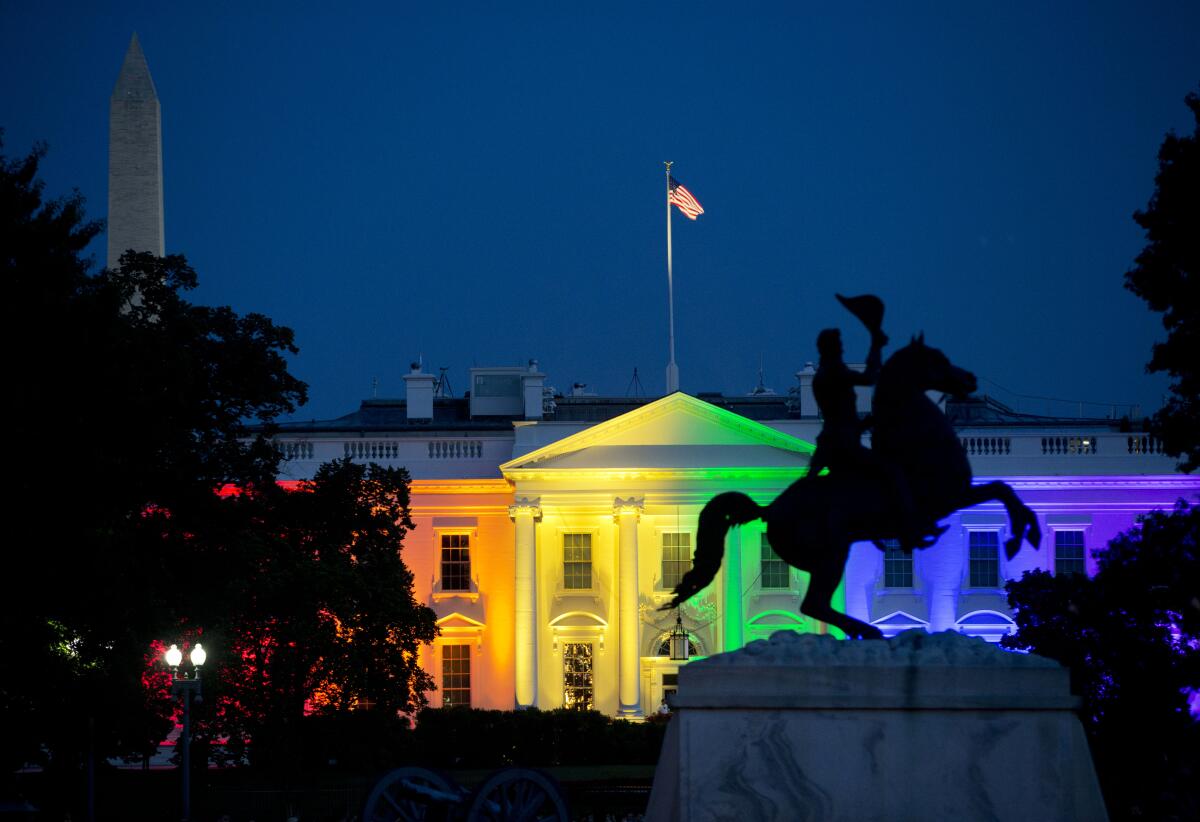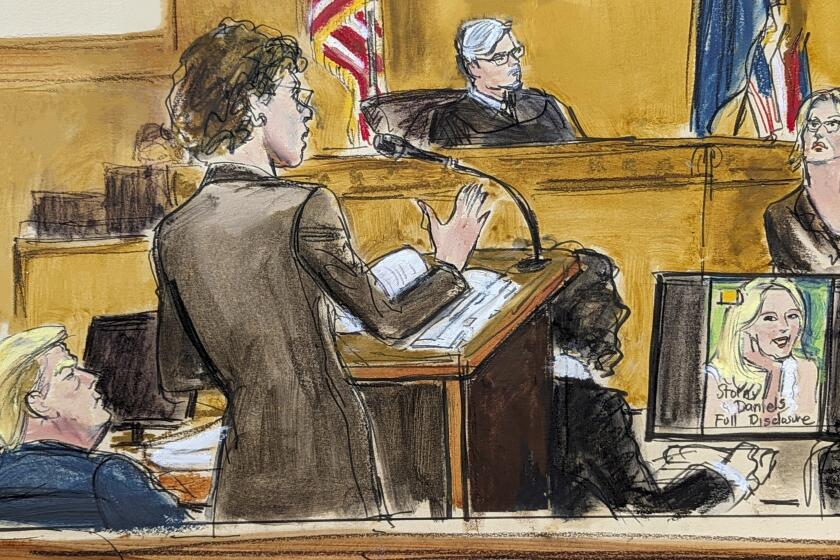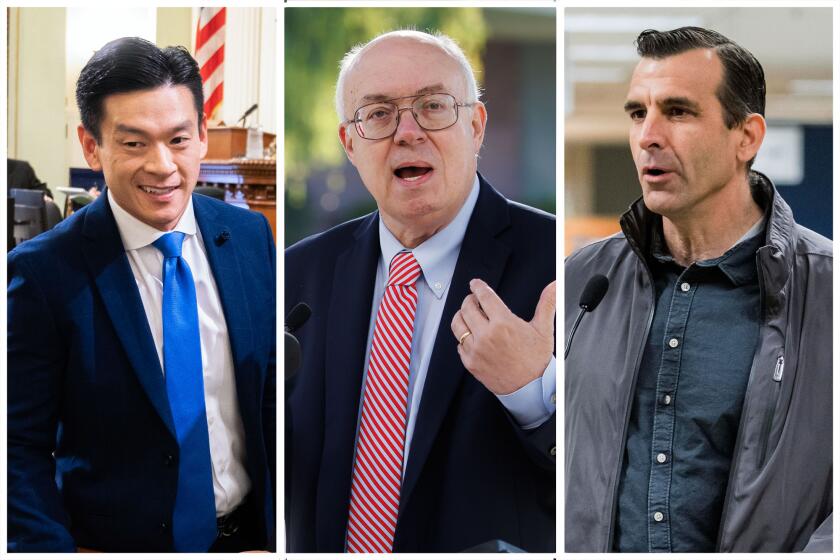Newsletter: Why LGBTQ rights may be secure despite the Supreme Court

Ever since the leak of a draft Supreme Court opinion early last month showed the justices were on the verge of overturning Roe vs. Wade, the decision that guaranteed abortion rights nationwide, attention has focused on what other rights might be in jeopardy.
Because of that, Pride Month this year is taking place as many LGBTQ Americans worry about the security of their rights, starting with marriage equality, which the high court ruled in favor of seven years ago.
How far the increasingly bold, conservative justices will go in repudiating the high court’s half century of decisions regarding a right to personal privacy is anyone’s guess. But justices, even activist ones, operate under a series of constraints — institutional, legal and political — which pose some limits.
Get our L.A. Times Politics newsletter
The latest news, analysis and insights from our politics team.
You may occasionally receive promotional content from the Los Angeles Times.
Public opinion can play a major role in those constraints.
A profound shift
Over the last generation, the U.S. has gone through a remarkable shift in public opinion about the rights of LGBTQ people.
In 1996, Gallup found just 27% of Americans favored recognizing same-sex marriages as legally equal. Since then, support for marriage equality has grown year after year, by an average of between one and two percentage points. That sounds small, but it adds up. When Gallup released its latest update on Wednesday, support for equal marriage rights stood at 71%.
Notably, majority support for marriage equality came before the Supreme Court decision, Obergefell vs. Hodges, which cemented the right nationwide. By the time the court ruled, about 6 in 10 Americans already supported legal equality.
Similarly, polls showed strong support for laws to protect LGBTQ Americans against discrimination long before the court ruled in 2020 that federal civil rights law protects LGBTQ Americans from job discrimination. That 6-3 ruling did not affect other forms of discrimination, which remain legal in many states, especially in the South and Midwest.
Almost 8 in 10 Americans now back laws to protect LGBTQ people against discrimination in jobs, housing and public accommodations, according to polling released earlier this year by the Public Religion Research Institute. Forty-one percent strongly support anti-discrimination laws, compared with 20% who oppose them.
The shift in attitudes has come partly from a younger generation entering the ranks of American adults, but also from older people changing their minds. Among adults aged 65 and older, for example, a majority supported marriage equality as of 2016.
A decade ago, Third Way, a Democratic think tank, commissioned a study that found about 75% of the shift in public opinion had come from people changing their minds, said Lanae Erickson, the group’s senior vice president.
Studies have shown that a key factor in people switching their view has been knowing a gay couple. That’s led to a self-reinforcing cycle — as legal rights have strengthened, LGBTQ people have been more open, which means more people know them, which, in turn, leads to more acceptance.
And the fact that LGBTQ people are more or less randomly distributed in American families makes the dynamics of the debate unusual, Erickson noted. The discussion is “about rights for someone you know,” as opposed to a group that the majority may perceive as a distant other, she said.
That has “enabled us to make gains faster,” Erickson said. It has also meant that support for LGBTQ rights is one of the rare issues that has grown less politically polarized in the last decade. Support for marriage equality became the majority view among Democrats in 2004. It crossed 50% among Republicans in Gallup’s data in 2021.
The one major demographic group among whom support for marriage rights has not reached majority status is weekly churchgoers, Gallup reported Wednesday. Among that group, support stands at about 40%. That’s likely to change over time — surveys show that younger people in nearly all denominations have more accepting views on LGBTQ issues.
Even religious groups that oppose same-sex marriage, such as Mormons and white evangelical Protestants, now have majorities who support anti-discrimination policies, the Public Religion Research Institute found.
Some regional variation exists: Support for marriage equality is strongest in the East (79%) and the West (71%) and weakest in the South (66%), Gallup found. Even in the South, however, most states now have majorities that support same-sex marriage. A 50-state survey by the Public Religion Research Institute found only four states in the U.S. where support for marriage rights was 50% or less — Mississippi at 44%, Arkansas 47%, Alabama 49% and South Carolina 50%.
The steady shift of public opinion on marriage equality differs sharply from public opinion on abortion. Despite some fluctuations from year to year, U.S. opinion on abortion has changed very little for decades: About 6 in 10 Americans support abortions being legal most of the time, but a majority also supports a range of restrictions, according to the Pew Research Center. About 4 in 10 think abortions should mostly be illegal, including just under 1 in 10 who want them banned entirely.
How might the the shifting in public opinion about LGBTQ rights affect the Supreme Court? A majority of the court may personally oppose Obergefell — three of the current justices dissented when the case was decided, and former President Trump‘s three appointees may all agree with those dissents — but public opinion does limit what the justices can do.
Most important, the high court can’t rule without a case.
The most natural way for a case to get to court would be for a state to pass a law limiting marriages by same-sex couples, much the way states have passed laws to limit abortions. A couple whose marriage was affected would sue, and the issue would work its way through the court system.
Right now, however, it’s hard to see what state legislature might want to start that fight. Unlike abortion, where a well organized movement spent much of the last half century building support for efforts to overturn Roe vs. Wade, there’s not much political muscle seeking to reverse Obergefell.
That could change — some Republican elected officials have continued to criticize the decision — and it’s possible that a case could reach the court in some way other than a new law, but the more public opinion shifts, the less likely that prospect becomes.
“The right has mostly come to terms with the fact that they’ve lost the broader fight” on LGBTQ issues, said Erickson.
The result is that conservative politicians focus on issues, like the status of transgender athletes, that affect much smaller numbers of people. At the same time, she added, “there are still quite a few people living in places where they don’t have protection against discrimination” and there’s little prospect of action at either the state or federal level to change that.
“I’m pretty optimistic about maintaining the gains we’ve made,” she said, but as on many issues, the national gridlock means that “any big efforts in either direction are likely to be stuck.”
Our daily news podcast
If you’re a fan of this newsletter, you’ll love our daily podcast “The Times,” hosted every weekday by columnist Gustavo Arellano, along with reporters from across our newsroom. Go beyond the headlines. Download and listen on our App, subscribe on Apple Podcasts and follow on Spotify.
The race for L.A. mayor
Coming Sunday: Our final poll of the mayoral race in advance of Tuesday’s primary.
And here’s our complete guide to the L.A. mayoral race.
In the meantime, as Julia Wick reported, with just a few days to go, Rick Caruso’s political evolution from Republican to Democrat still remains opaque to many voters in the overwhelmingly liberal city he hopes to lead. The real estate developer has changed his party registration four times in the last 11 years, shifting twice between Republican and no party preference before re-registering as a Democrat about four months ago.
Enjoying this newsletter? Consider subscribing to the Los Angeles Times
Your support helps us deliver the news that matters most. Become a subscriber.
The latest from Washington
A House panel met Thursday to begin writing a legislative package of bills to prevent gun violence, Nolan McCaskill reported. The action sets up votes on the House floor that could come next week. The main action on guns, however, remains in the Senate, where a bipartisan group has been meeting to see if there’s any legislation that Republicans will accept.
Biden spoke to the nation Thursday night, outlining his preferences for gun control, which go significantly beyond what the senators are talking about. As Eli Stokols and Courtney Subramanian wrote, the continued stalemate on guns is the latest issue on which a lack of progress has undermined Biden’s campaign claim that he was uniquely suited to break gridlock and solve long-standing problems.
Vice President Kamala Harris on Wednesday unveiled a White House plan to tackle water security as a foreign policy priority in light of ever tightening global water supplies. As Subramanian and Ian James wrote, the plan pledges U.S. leadership in the efforts to ensure there is enough water to support food supplies and healthcare systems. Under the initiative, the U.S. government will also spearhead ways to defuse potential disputes over access to water, Harris said.
Harris also took center stage in an administration plan to forgive loans for an estimated 560,000 former students of Corinthian Colleges, a group of for-profit schools that she helped put out of business when she was attorney general of California. As Noah Bierman reported, the Department of Education will absorb the estimated $5.8-billion cost of the outstanding federal loans that will be forgiven under the plan. The administration said it’s the largest single loan discharge made by the department in its history.
The latest from California
Our final pre-primary poll of the races for governor, attorney general and Senate finds the Democratic incumbents far ahead and well positioned for the general election. As Hannah Wiley and Phil Willon wrote, Gov. Gavin Newsom has a massive lead over a large field of mostly little-known challengers. Atty. Gen. Rob Bonta is well ahead, as well, and seems likely to draw the conservative Republican opponents he had been hoping to face in November. And incumbent Sen. Alex Padilla appears to be cruising toward reelection.
Earlier, Willon looked at the 25 challengers vying for the dubious distinction of facing off against Newsom in the November runoff. The governor’s would-be challengers are hoping lightning may strike, he wrote.
The congressional district that covers northern Los Angeles County likely will be among the hottest political battlegrounds this fall, as Democrats try to unseat Republican Rep. Mike Garcia. But as Seema Mehta and Priscella Vega wrote, the first order of business is picking the Democratic challenger — former Assemblywoman Christy Smith, who lost to Garcia last time, or former Navy intelligence officer John Quaye Quartey, a political newcomer.
Robert Rivas, a Democrat from San Benito County on the Central Coast, and an advocate for farmworkers, secured the support Tuesday from his current Democratic colleagues to become the next speaker of the California Assembly. As Taryn Luna reported, the announcement concluded days of turmoil as Rivas and current Speaker Anthony Rendon (D-Lakewood) each sought control of the chamber. The two legislators offered no timeline for a transition of power to Rivas, who said the caucus wants to keep Rendon in charge until at least the end of the legislative session in August.
Lourin Hubbard has one of the harder assignments in American politics — running as a Democrat in a deeply Republican congressional district in a special election to fill a seat that will disappear in January. But as Priscella Vega reports, as a 33-year-old Black political contender in a heavily white part of the Central Valley, he doesn’t lack for self-confidence.
Hubbard’s effort to win the last few months of Devin Nunes’ term is one of several congressional races to watch in Tuesday’s primary.
Sign up for our California Politics newsletter to get the best of The Times’ state politics reporting.
Stay in touch
Keep up with breaking news on our Politics page. And are you following us on Twitter at @latimespolitics?
Did someone forward you this? Sign up here to get Essential Politics in your inbox.
Until next time, send your comments, suggestions and news tips to politics@latimes.com.
Get the L.A. Times Politics newsletter
Deeply reported insights into legislation, politics and policy from Sacramento, Washington and beyond. In your inbox three times per week.
You may occasionally receive promotional content from the Los Angeles Times.




